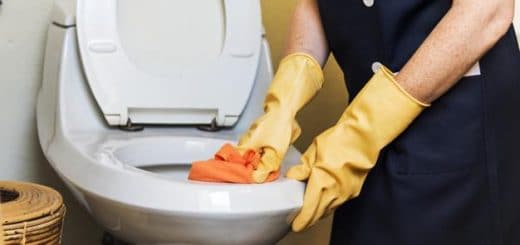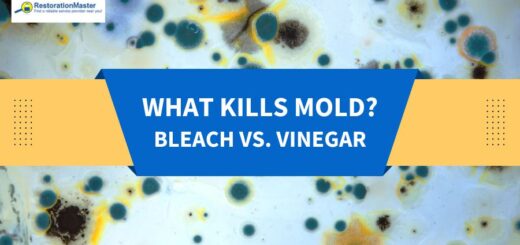Tips for Sealing Natural Stone Countertops
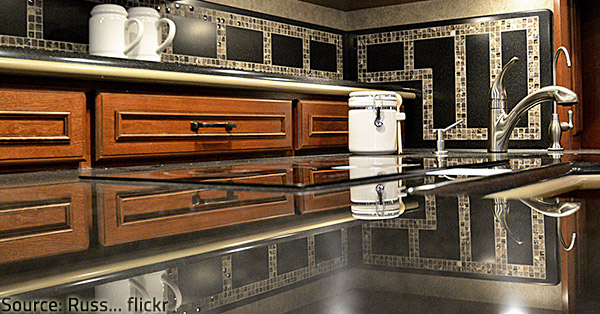
Preserving the good condition and the delightful look of natural stone countertops requires proper care.
Natural stone countertops not only provide durable and convenient surfaces to use on a daily basis, but also impart beauty and warmth to your home design. This rare combination of great practical functionality and high aesthetic value allows you to have a low maintenanceMaintenance is the routine care, inspection, and repair of a... More, very efficient and charming kitchen.
Proper care can preserve the good condition and the delightful look of your countertops. Natural stone comes in a great variety of colors and patterns that differ in texture and structural features which results in specific maintenanceMaintenance is the routine care, inspection, and repair of a... More requirements for each type of stone. And while it is generally recommended to immediately remove spills and regularly clean your countertops regardless of their type, you better be careful when choosing the appropriate products and techniques for polishing and protecting the different stone surfaces. Methods that yield very good results and provide maximum protection for some stone types may not be adequate for others. Sealing natural stone is among these controversial protection practices.
Do Countertops Need to Be Sealed?
It is a common misconception that sealing your countertops is the best way to prolong their life and to prevent stains and etching, regardless of the specific material. Sealing natural stone countertops indeed protects them from the wear and tear associated with most household activities but it is not appropriate for certain kinds of stone. They just won’t absorb the sealer, so it will dry over the surface and will create a hazy, streaky mess.
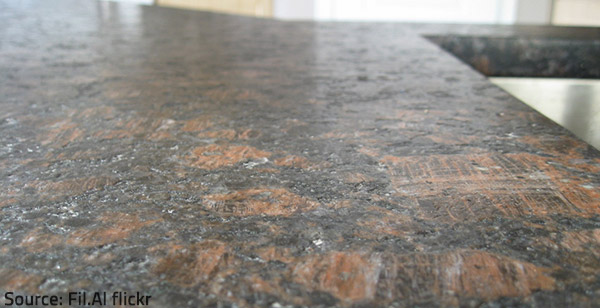
Sealing is not an appropriate option for all kinds of stone.
Stone Types
So, first you have to determine your countertop type and its specific sealing requirements. To avoid mistakes and problems, you need to know what kind of stone you have, how to maintain it, and if sealing is at all necessary:
- Marble, travertine and limestone are all softer stones that are prone to scratches and staining, which is why polishing is typically recommended;
- Some types of granite are more absorbent than others and sometimes granite is mixed with other materials, so the resulting countertop surface can easily corrode or etch when exposed to acids like fruit juice, coffee, alcohol, salad dressing, etc.;
- Soapstone isn’t porousPorous describes a material that contains small openings or ... More at all but it is extremely soft. This means that it will not stain much, but the surface can be scratched very easily. Sealing soapstone countertops is mainly performed for aesthetic reasons in an attempt to avoid superficial scratches;
- Some stones are very dense and won’t absorb neither spilled liquids, nor sealers, so sealing is not recommended;
- Sealing quartz countertops is usually not required as their surfaces are non-porous and durable enough.
Have in mind that polishing can considerably decrease the absorptionAbsorption is the process by which a material takes in or so... More rate of all stone types.
Some natural stone countertops are pre-sealed during manufacture. They are extremely durable as the sealer penetrates the stone to a deep level and provides lasting protection. Industrial sealers are based on resin, so they can successfully fill any tiny cracks and seal the numerous pores in the stone that would otherwise accumulate moisture and/or dirt. However, some of the natural character of the stone may be lost in the sealing process.

Take appropriate measures, so that your beautiful stone countertops stand the test of time.
Efficient Tests
So, should you seal countertops? As a general rule, most dark-colored denser granites do not require sealing. Travertine, limestone, and many marbles don’t need sealing when polished and soapstone is usually sealed for cosmetic reasons only. To know for sure if your countertop needs to be sealed, you can perform the following simple tests:
- Perform the paper towel test – soak a paper towel or a white cotton towel with clean water. Place it on the counter and wait about 5-10 minutes. If the area under the wet towel becomes dark or discolored, your natural stone needs to be sealed to resist water-based spills and stains;
- Perform the solventA solvent is a liquid capable of dissolving other substances... More test – drip some paint thinner, lemon juice or cooking oil on the countertop and observe it for 5-l0 minutes. If the stone goes dark, you should use an impregnating sealer to protect the surface against oil-based stains.
These tests are very efficient and beneficial especially when it comes to sealing granite countertops. Applying a sealer that is not needed may not be a problem for most types of stone but dark granite is very dense and if a sealer is used, it will just sit on the surface and may noticeably dull the appearance. If this happens, the granite sealer should be stripped and the surface should be re-polished.
How to Seal Natural Stone Countertops
Sealing countertops prevents dirt, dust, and moisture from seeping through the stone. Most stones are porousPorous describes a material that contains small openings or ... More which makes them very absorbent – water and acids can percolate through and damage the color and the structural integrity of the stone. Natural stone sealers prevent liquids from penetrating deeper into the stone and make the surface resistant to stains and minor damages. Here are some practical tips on how to seal granite and other natural stones:
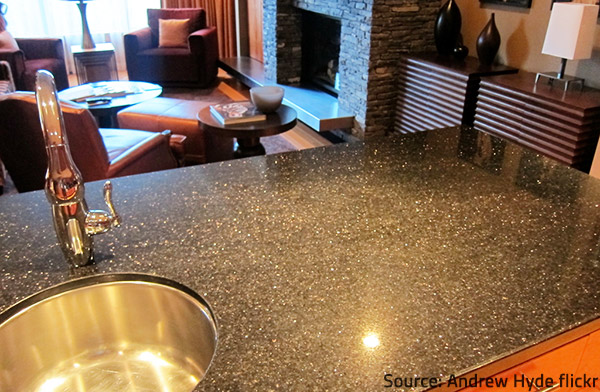
Make sure you know what kind of natural stone sealer will be the most suitable one for your kitchen countertops.
Choose a Quality Sealer
Choose a natural stone sealer that is appropriate for the specific requirements of your kind of stone countertop. Generally, you want the sealer to enhance the functionality of your countertop without degrading its look or feel and to make it resistant to stains from food, oil and other common household substances, as well as resistant to heat from hot pots and pans and, if possible, resistant to etching from acidic substances like lemon juice and vinegar. Besides, your countertop surface should be scratch-proof, easy to clean, and safe (non-toxic). Quality sealers provide long term protection without the need for frequent maintenanceMaintenance is the routine care, inspection, and repair of a... More or re-application.
You have a choice between water-based sealers or solvent-based sealers to prevent staining and reduce soiling. Impregnating stone sealers are considered to be more efficient because they easily penetrate the stone to fill its pores and fissures. If resin has been applied to your countertop, you will need a resin based sealer, especially designed for the purpose.
Quality sealers can last up to 10 – 15 years and guarantee adequate protection to your expensive and delicate countertops, provided that you know how to seal natural stone properly.
Clean the Countertops Thoroughly
Before applying a sealer, you need to wipe your countertop clean of any dust, dirt, soap residues, etc. First, remove any larger particles with a dry clean rag and then use an appropriate cleaning solutionA solution is a homogeneous mixture of two or more substance... More to make the surface spotless. Let it dry well before proceeding.
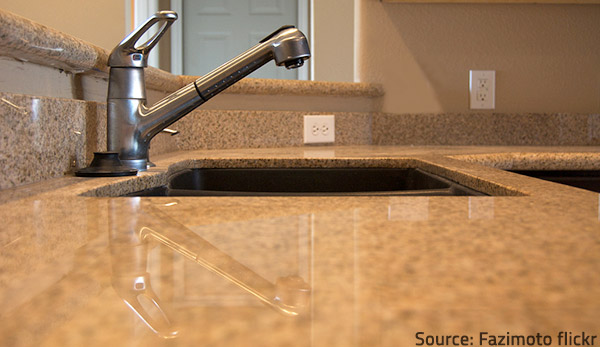
Your countertops should be spotless before you apply the sealer.
Apply the Sealer
Apply the sealer as directed by the manufacturer – either spray it on the surface or use a brush (or a clean rug). Work one section at a time (test on a small inconspicuous area first) and allow about five minutes for the sealer to penetrate the stone. Then apply a second layer and wipe off the excess with a clean cloth. Repeat the same procedure for the next section and go on until the entire surface has been properly sealed.
Reapply after a Couple of Hours
Wait for about two hours for the sealer to dry completely and then apply one final layer. Sometimes, a single layer may be enough – you can test the efficiency of your sealer on a small hidden spot before reapplying.
The entire process is simple and easy when you follow our valuable tips for sealing natural stone countertops. Remember that it is of paramount importance to completely remove any sealer residueResidue is any leftover material, such as soot, dust, or che... More from the surface after it has been absorbed into the pores, but before it dries.
However, if you lack self-confidence or the time required to perform the job carefully, you may consider hiring professional help. Especially when you are not sure whether your natural stone countertop needs sealing or not and what type of sealer will be appropriate, you’d better not risk ruining your elegant and convenient kitchen feature. Leave the job to professionals who have appropriate equipment and rich experience in handling natural stone countertops.
Once your countertops have been properly sealed, you need to maintain them properly in order to secure their flawless look and feel for many years.
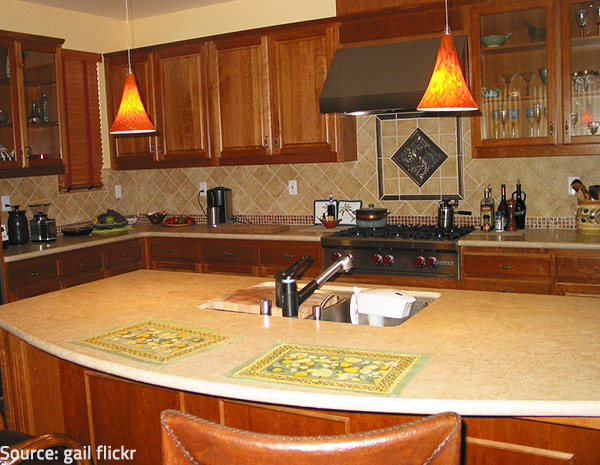
Sealing can considerably improve both the durability and the beauty of your countertops.
How to Maintain Countertops
Maintaining sealed natural stone countertops is very easy but you should observe several simple rules:
Clean and Protect Your Countertops Properly
Countertops are used on daily basis, so they should be cleaned frequently:
- Wipe them daily with a dry clean rag to prevent accumulation of dust and dirt and to remove any excess moisture;
- Use an appropriate cleaning solutionA solution is a homogeneous mixture of two or more substance... More at least once a week to better disinfect the surfaces you use for food preparationPreparation is the steps taken to ready a property, equipmen... More and storage;
- Avoid abrasive and harsh cleaners, as well as any products that contain acids, vinegar, ammonia, bleach, etc.;
- Remove spills immediately to prevent possible penetration and keep the surface dry all the time.
Don’t forget to protect your countertops:
- Put hot dishes and cookware on trivets or mats;
- Use place mats under china, ceramics, silver, and other objects that can scratch the stone surface;
- Use coasters under glasses, especially if they contain alcohol or citrus juices.
Reseal When Necessary
Resealing is recommended for preserving the good condition of your countertops for many years. Its frequency depends on four crucial factors:
- The absorptionAbsorption is the process by which a material takes in or so... More rate of the stone (whether it is porousPorous describes a material that contains small openings or ... More or dense);
- The type and quality of sealer used (an appropriate granite sealer or another adequate sealer);
- Competence of the workmanship (how well the sealer was applied);
- Appropriate cleaning products and methods (harsh cleaning agents degrade the sealer).

Beautiful and flawless natural stone countertops add compelling charm to your home design.
As a general rule, light colored granites and honed or tumbled softer stones, such as marble, travertine, limestone, and onyx, need resealing every 1-3 years, while dark colored granites and quartz may not be resealed at all. However, the porosity of the stone and the quality of the sealer (as well as its proper application) are also significant factors.
You can perform the above-described tests to know for sure when your natural stone countertops need resealing.
The highest quality sealers can protect your countertops for 10 to 15 years and even if they degrade over time, it’s certainly much easier and far less expensive to reseal your stone surfaces rather than to deal with the hassle and the high prices, typical of total replacement or restorationRestoration is the process of returning a property to its pr... More.










